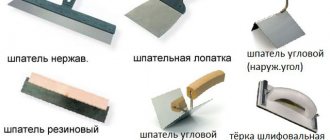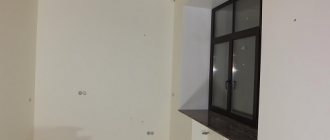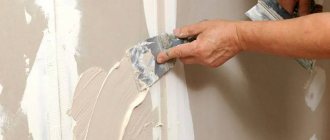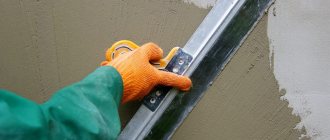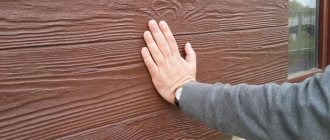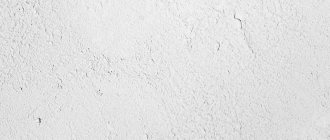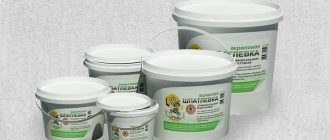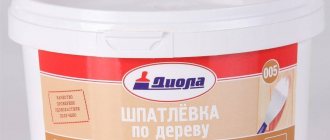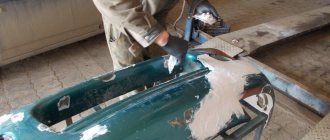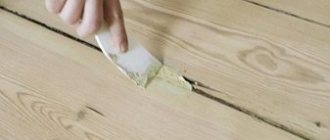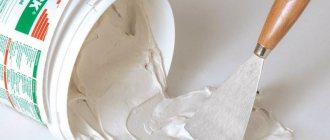- January 13, 2021
- Repair Tips
- Tatyana K
The Russian language is amazing and mysterious, and not everyone can immediately determine how this or that word is spelled. To understand whether this or that part of speech is written correctly, they resort to studying peculiar rules and looking into the origins of the word. The word “putty” was no exception. Or should I just “putty”? And which is correct - putty or putty? Let's try to figure this out.
What kind of animal is this shpak(t)levka and where did it come from?
Putty (or putty) is a material necessary for carrying out repair work, in particular for leveling surfaces by covering up irregularities.
How to say correctly - putty or putty? The word “putty” comes from the verb “putty,” which also meant working with a spatula (a leveling tool for various applications). “Spatula” as a part of speech is of German origin and implies a commonplace spatula.
Spatel in German
In German the word spatel has two meanings:
- In the first case, it is a spatula for leveling thick mixtures, mixing paint, rubbing it over the surface, and applying the resulting solution to it.
- The second version of the meaning of the word is a medical instrument for pressing the tongue during an examination of a patient or pushing back the edges of a damaged area of the body, as well as for other medical purposes.
In other languages it sounds like spatha (Latin), spatola (Italian), szpadel (Polish). Who knows, perhaps we owe the appearance of this word in our vocabulary to Peter I...
At the moment, the official version for the functioning of the word “putty” is the performance of construction work. However, the fact that builders prefer the definitions “putty” and “putty” is quite understandable. This is due to the same “German” tool for work.
“Putty.” What else is this?
Understanding the question of how to speak and write correctly - putty or putty, it is worth dwelling on one more rather strange word - “putty”. Many will say that it does not exist. However, it existed and left the language only 200–300 years ago (previously in Dahl’s dictionary this word was an analogue of the modern “putty”). Perhaps this word appeared precisely thanks to the Polish szpadel.
This word was used until the mid-nineteenth century, and was also borrowed from German. But in German, “spatula” is also spelled with a “t.” What's the point? The fact is that the German language provided two spelling options, and both were correct: one with the usual letter “t”, the other with “d” (spadel).
Because of this, many construction workers of German origin referred to the leveling process as “putty.” This term was popular, which is why it ended up in Dahl’s dictionary.
What was the reason for the “departure” of the term? By the middle of the 19th century. this form of the word left speech by itself, there are no significant reasons for this. Therefore, the word “putty” is not considered when determining the correct spelling of the term, and is even wild for most ordinary people.
Two different views on words
Foreign or native dialect? This is the only question that allows you to understand the spelling and pronunciation. Putty or putty? This problem is faced not only by ordinary people, but also by professional linguists. The reason for this is two different views.
- Foreign origin;
- Original Russian language.
During repairs, craftsmen use a spatula
Officially, puttying is understandable, but you still need to consider both options in detail. There are still scientists who claim that the pronunciation is incorrect. It's time to get to know the intricacies yourself and draw personal conclusions.
Foreign origin
The foreign origin of the word “putty” has already been indicated. The reason for this writing is the exclusively hand tools used in the work. In reality, almost no one remembers him, but they continue to speak correctly.
Most explanatory dictionaries are based precisely on this principle. By using it, you can figure out the problems. Although the Russian-speaking population does not like this attitude. Today, some young people do not recognize the foreign roots of the dialect, so they find other explanations. In this case it is much easier to do this than in any other.
Original Russian language
The original Russian language suggests a different understanding of the choice to putty or putty. In ancient times, ordinary tow was used for whitewashing. Using it, whitewash was applied to any surface, so this particular tool was considered the main one among the craftsmen.
The use of putty remains a traditional interior treatment, but few people still know what to call it
Now this principle of operation is a thing of the past, but some people still believe that the origin of the word came from this understanding. If you rely on such a statement, you will have to agree with it. This attitude cannot be called completely correct, because no one used tow when applying modern mixtures.
Where did “spaKlevka” come from then?
To understand why and how to say correctly - putty or putty, let's consider the origin of this word. Putty used to be the name for a coarse, unprocessed fiber not suitable for yarn. It was used to clog the cracks of houses. That is, this is, in fact, a banal tow. The procedure for sealing cracks is thus called “patting”. What did the tow actually mean? Let's figure it out now. In fact, it is a waste product from the processing of flax or hemp, which has been treated with resin.
Therefore, most likely, with the development of technology, “putty” was replaced by the people with the usual “pavement”.
The names of the terms took place and did not overlap with each other, and then, most likely, ended up in Dahl’s dictionary due to his ignorance of the difference in definitions. Therefore, “shpaKlevka” year after year began to displace “shpaTlevka”.
But which is correct: putty or putty? Dalem combines the definitions of “putty”, “putty” and “putty”, and each of them means covering the damaged areas in the areas being repaired with a special solution. In order to understand how to properly putty or putty, we will find out what this finishing material is.
What conclusions should we draw?
The use of putty remains a traditional interior treatment, but few people still know what to call it. Often they simply do not try to understand such details, considering them unimportant. It is more convenient to pronounce a word in your own way, without thinking about its true meaning. It is necessary to draw conclusions in order to obtain useful information.
- According to explanatory dictionaries, the word is of foreign origin.
- The word comes from a hand tool, a spatula.
- The Russian understanding cannot be called completely correct, since tow is not suitable for work.
When drawing conclusions, you need to seriously think about how important it is to understand the details of the Russian language. The putty composition remains indispensable, but workers rarely remember its correct name. If you approach this issue from a scientific point of view, the dictionary will accurately indicate the correct spelling. It is this that turns out to be useful, because maintaining the purity of the native language is gradually becoming a thing of the past.
The only letter continues to torment the minds. People always want to comply with all the rules and at the same time enjoy comfortable pronunciation. Today there are many concessions that allow you to refuse to take into account spelling requirements. Masters can communicate with each other without ceremony, although this is wrong. It is better to seriously think about the subtleties, because the words of our children, who will not learn to place letters correctly, depend on them.
What kind of “putty” (or “putty”) is there?
Puttying is a difficult process. It contains many nuances that need to be understood. First you need to understand what types of putty exist. (Or is it putty?)
Users have also been arguing for a long time about which is correct - wall putty or wall putty? The pronunciation and spelling of this word and their reasoning about it differ significantly.
Some say that correcting defects on surfaces is putty, and the material, of course, is putty. In their opinion, these words come, as mentioned earlier, from the name of the construction tool with which the leveling procedure is carried out.
Their opponents are of the opinion that these are completely different things, meaning completely different phenomena. They interpret putty as a dry powder for making a mixture sold in hardware stores.
The putty itself for them is an already prepared solution, which helps smooth out the relief areas of the surfaces.
There are also those who believe that both options have the right to exist, and the difference between words (more precisely, letters) is completely absent.
Origin
The origin of the term takes us back to the heyday of the Great Roman Empire. It was thanks to the expansion of Rome that many modern languages inherited a huge number of Latinisms; Moreover, the letters themselves, which are used in modern Europe and America, are of Roman origin and are called... yes, the Latin alphabet.
To clarify: the vast Empire was, of course, a multinational entity, and most of its subjects predictably spoke their own dialects. However, all paperwork was conducted in Latin, which has since undergone minimal changes.
Unlike the Latin language, which froze unchanged after the fall of Rome, other European dialects did not become static: new terms underwent changes. Having entered into everyday use, they were transformed for ease of pronunciation and borrowed by representatives of other language groups.
Understanding the mechanism of these processes, it is not difficult to trace the appearance of the term we are discussing in the Russian language.
- Its distant ancestor is the Latin word spatha . It just meant “spoon.”
The word spatha was also used to describe such an object. It was used to introduce Roman democracy into the government system of the countries of future Europe.
- The diminutive form of spatha in Latin is spathula . Probably the word “spoon” will be the most accurate tracing paper.
- From here it is not far to the German term spatel . What does it mean? Same as in Russian: a small flat spatula for applying something to something.
Let's be clear: a spatula is a tool used not only in construction. It is used for applying primer to canvas by artists and for examining the oral cavity by ENTs and dentists; Moreover, of course, the sizes of the instruments and their shape vary over a wide range. But the name remains.
And yet: how is it right?
So, which is correct: putty or putty? Having determined where different terms came from, it is also worth understanding how to correctly express yourself and use these words. The answer to the question of how to write - puttying or puttying the walls is the name of the mixture for the work. And, oddly enough, it’s called “putty.” Although manufacturers write as they want, the meaning of what is written is still clear to everyone.
Both words, as was established during the study of etymology, mean leveling surfaces immediately before the start of finishing work using a special solution of the same name.
Many dictionaries (Efremova, Kuznetsov, Lopatin, etc.) identify concepts from the position of equivalent ones. Ozhegov's Dictionary, Big Encyclopedic Polytechnic Dictionary, Dictionary of Synonyms agree with them and equate these concepts.
Let's summarize, which is correct: putty or putty
Thus, the verbs “putty” and “putty”, as well as the words derived from them “putty” and “putty” are equivalent and suitable for use in speech without violating lexical norms. Of the variations of the spelling “putty”/“putty”, you can use any one you like and not make a mistake in your choice, however, the original, original root - putty - still has a professional connotation, speaks of the specialty of the person who used this word, in other words, it is more often used by builders, directly working with the specified material and pronouncing the word based on the name of the tool for work, that is, a spatula.
Moreover, even such outstanding linguists as I. L. Reznichenko in the Orthoepic Dictionary of the Russian Language and A. P. Evgenieva in the Dictionary of the Russian Language noted that the words “putty” and “putty” have a narrow, specialized - technical meaning.
Therefore, the conclusion as to whether putty or putty is correct suggests itself: it is correct to use the term as you see fit, there will be no significant difference when pronouncing “putty” or “putty”, everyone will be able to understand you. Moreover, no spelling error will be made when using each of the selected words. However, it is worth refraining from using the word “putty” - after all, this term has long turned into an archaism.
Putty and plaster: what is the difference?
If putty and putty are one mixture with different historical names, then plaster is a completely different material. It consists of cement, sand, polymer additives, stabilizers and plasticizers. Even coarse crushed stone is introduced as a filler, so the granularity of the mass can be distinguished even visually.
Plaster is used to straighten crooked walls, eliminate blockages, large cracks, potholes and other large defects. Putty is needed for delicate work, such as covering seams or scratches. It is not suitable for eliminating large differences and is applied thinner.
The thickness of the plaster is up to 10 mm, but it can be applied in several layers with a total thickness of up to 50 mm. Above 30 mm, reinforcement with steel or fiberglass mesh is used to give the coating additional strength.
The plaster is applied directly to the primed base, but the putty can be applied to the plaster for final cosmetic work. This is necessary if you plan to cover the walls with thin wallpaper or simply paint them with paint.
Curtains for the living room in a modern style (65 photos)
